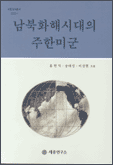US forces in Korea, which have played a central role in the Korea-US alliance, recently celebrated the 50th anniversary of their stationing on the Korean Peninsula. These forces have long been credited with maintaining the balance of power and stability in Northeast Asia. However, as a result of the landmark Inter-Korean Summit of June 2000, the era of Korean reconciliation has begun. As exchanges and cooperation between the two Korea have increased, South Koreans' perception of the threat emanating from the North has faded. As a result, the role of USFK will inevitably undergo changes. The Bush administration, which came to power amid these changes on the peninsula, adopted a hard-line policy towards the North, which the North countered by raising suspicions about its nuclear capabilities. All of this has resulted in throwing the Korean peninsula into crisis. The Roh administration came to power advocating the need to out US-Korea relations on a more equal footing. Meanwhile, the Bush administration's desire to redeploy and restructure its forces on the Korean peninsula has made a fundamental alteration of the alliance a foregone conclusion. The South Korean government now faces the following tasks: the second North Korean nuclear crisis; the restructuring of USFK; and the readjustment of the Korea-US relations. As the restructuring of USFK and adjustment of the Korea-US relationship have become the most important issues between the two countries, the timing of this book is very fortunate and because these issues which will also affect the search for a peaceful solution to the North Korean nuclear crisis and the development of inter-Korean relations. This book is expected to contribute to the formulation and actual implementation of the Korean government's policies towards the North Korea and US, as well as to the development of the field of security and foreign policy.
No : 2003-01
Publishing Company : The Sejong Institute
Date of Publication : 2003
Number Of Pages : 224 Page
Price : 9,000 Won
